Expanded from the article Slackorality published in Beat Magazine, Aug/Sep 2004, Vol. 23, No. 4.
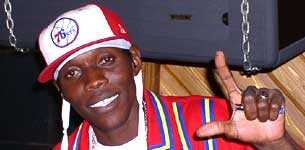
Vybz Kartel
Wayne Marshall and Vybz Kartel tease, Why you chewing it when you should be screwing it? I know you never see a curry or a stew in it, in their 2003 hit Why You Doing It?
Dancehall lyrics have always mirrored Jamaican society. Lyrics reflected gun culture in the 1980s promoting violence, the girl tunes in the 1990s promoted shallow and abundant sex, the battyman tunes called for the killing of homosexuals, and now in 2004 we have a new breed of lyrics: the no nyam pum pum set. More frankly in plain English, the dont eat pussy lyrics.
As a woman, these lyrics fascinate me. Where did they come from? What is the root of this issue? How does this message manifest in the music? Why are these songs getting such big forwards? And lastly, what are the implications for women? My intent is not to burn fyah or pass judgment on the entire culture, rather to take an anthropological look at the subject by talking to various artists and women in the society. These songs are, in fact, a guilty pleasure for me, yet I am also equally disgusted when I read the lyrics. The anti-oral sex theme is an equal opportunity issue in Caribbean culture; however, men are the dominant voice of the dancehall so the male perspective transmits much louder. The anti-oral sex songs, albeit fun, energetic, and playful are ultimately fundamental in keeping women oppressed.
 I found many hypotheses about the root of the issue. First, oral sex is a taboo because, according to the Bible, womens menstruation makes that area “unclean at all times (see Leviticus 15:19 -20). Second, fearful of homosexuality, a man doesnt want to put his mouth where another man has “been. Third, in a patriarchal society, oral sex puts males in a subservient position and most men, nah bow down to women.
I found many hypotheses about the root of the issue. First, oral sex is a taboo because, according to the Bible, womens menstruation makes that area “unclean at all times (see Leviticus 15:19 -20). Second, fearful of homosexuality, a man doesnt want to put his mouth where another man has “been. Third, in a patriarchal society, oral sex puts males in a subservient position and most men, nah bow down to women.
The foundation of the issue, however, seems rooted in a religious context. The Bible doesnt say anything specific against oral sex and we know that the practice has been around since ancient Indian times because of pictures in the Kama Sutra (5th century A.D.). The Bible does advocate both for reproduction and sexual morality:
And God blessed them, saying, be fruitful, and multiply, and fill the waters in the seas, and let fowl multiply in the earth.
–Genesis 1:22-23
It is God’s will that you should be sanctified: that you should avoid sexual immorality; that each of you should learn to control his own body in a way that is holy and honorable, not in passionate lust like the heathen, who do not know God For God did not call us to be impure, but to live a holy life.
–1 Thessalonians 4:3 ,4,5,7
Being fruitful and multiplying is an important aspect of a sexual encounter; therefore oral sex is futile. As Vybz Kartel and Wayne Marshall humorously relate, there isnt food down there, so why eat it?
Biblical allusions do explain this cultural phenomenon, however, a man who deliberately withholds giving pleasure to a woman objectifies his partner as a vessel for his own pleasure, rather than viewing her as an equal partner.
As I listened to a string of girl tunes, the messages were powerful and overwhelming: shes hot; she calls me too much; Im in love with (x number of) women; I want to sex her; girls are fighting over me; I want to breed up the girls; she wont leave me alone; I like new pussy; her pussy is too tight or too loose; shes dumb; shes wants me for my money; I like her for her money, and lastly, shes got a disease. This does not speak well of the status of womanhood in the Caribbean.
In many cases, the rhythms and music take precedence over the actual lyrics. Think about Capletons fervent delivery–he is energetic, angry, and uses great beatsa huge appeal for both Caribbean and North American audiences. For the international audience, the lyrics go unnoticed, but for a Caribbean one who understands, it is hard to ignore that in the song Bun Out Di Chi Chi , hes chanting, Batty dem a fuck and a suck too much pussy.
Its not only the Rastafarian brethren who are rejecting this act. Spragga Benz sings in disgust, Some bwoy ! Every gal dem get dem haffi nyam it up in Ram It Up. Assassin advises in Diet,
What dem want to do a fi nyam unda Dorothy Dun di sucka dem , di nasty fucka dem , di one dem no want fi nyam no chicken or no duck again. Dem bwoy , they cant drink outta mi cup again.
Beenie Man (in Red and Thats Right), Elephant Man (in Bun Down Dat), and countless others have jumped on this bandwagon.
The lyrics are presented in a way that is seemingly not hateful. The artists are criticizing the act of oral sex, rather than judging women in general. The assumption from the artists is We love women. We love pussy, but we burn down that specific act.
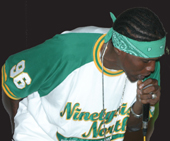
Vybz Kartel
Womens body parts are the focus of many of the songs. Vybz Kartel is expert at singling out specific areas, Tight pum pum , mi wi miggle deh. Clean breast, mi wi juggle and dribble deh or in Sweet to the Belly, Squeeze up di breast like jelly. In Buss It Off , he whispers, Gimme the breast, mek me licky the breast. Me a the man who fi deal with you titty the best. When men begin to objectify women in this way, the view of the whole person is lost and the natural progression is violence. This has been chronicled in much of the feminist literature of the 20th century.
What messages are reaching women? It seems that women are only as good as their best body part. The concept of the three-dimensional woman gets lost in the mix–there is a huge rift between how men view their mothers, daughters, and sisters, versus how women are portrayed in the dancehall.
There is, however, a guilty pleasure in listening to these tunes. Monica Espiritu , a Filipina social worker in San Francisco , California , enjoys these songs as I do. She theorizes, I liken slack to the shadow side of all us: the anger, rage, greed, raw sex, Bacchanalia. We have the potential for all of this. We cant help it. Were human. Slack pushes our buttons and reminds us of our shadow side.
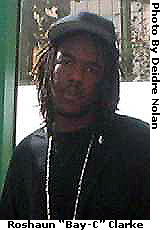
T.O.K.'s Bay-C
One would assume that the Jamaican dancehall quartet, T.O.K., known for their songs Punaany All Day, Shake Your Bam Bam , Shes A Ho, and their smash hit Chi Chi Man, would be the poster children for these anti-oral sex lyrics. However, when I spoke to bass vocalist Bay-C about their plans to follow this trend, he said, We are trendsetters. We dont follow trends! Were not here to make any divisions amongst our fan base or division amongst the world out there There are so many things going on in the world right nowworld wars and all kind of stuffthat we feel like its time to bring more love in the business more that anything that divides. A glimpse of hope, indeed.
The dancehall package includes faceless, unintelligent women, and videos support this concept of women as sexual objects. Showing many women wearing butt-floss may be provocative, but doesnt it get old quickly? Wouldnt it be revolutionary to uplift women rather than bring them down by advocating for a healthy model of femininity?
Tanya Stephens is a revolutionary in this regard. The deejay came from a poor family from the Jamaican countryside, and through her personal growth she came to question many of the assumptions of her environment,
I was like a boy growing up. I used to think they had too much privileges . They could do everything and I couldnt see any reason why I shouldnt be able to do it too, so I was running with them. I used to hate them! They didnt have the problem with their hair. They dont have to look any particular way. My hatred for their privileges made me like hanging with them more. I wanted to experience what they did. I want their privileges, I mean, I enjoy being a girl, but I want to be just equal to a man.
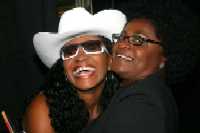
Tanya Stephens; photo by J. Lingo
With songs Its A Pity, Tek Him Back and Cant Breathe, Stephensraw, vulnerable, and strongtells it like it is. When I asked her about this new lyrical trend, she balked, I think that whatever two consenting adults do in their own privacy is nobodys business and there really doesnt need to be a song about it [laughs]! I dont think any of us are perfect enough, or even close to it, to hand down these judgments. Nobody needs your instructions about how to conduct their sex life, she reflected.
One reason these lyrics continue is that theres an audience for them. As long as there are women winding and grinding to how their pum pum is this or that, there are going to be songs made about them, noted Adjua Dubb , founder of Dubbotonical Productions, a production company in Washington D.C.
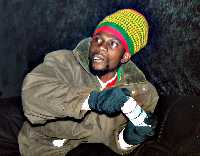
Determine; photo by Adebo Thomas
Many artists have a problem with oral sex, but they dont necessarily make it the main focus in their songs. The Rasta deejay Determine speaks out against oral sex when asked, but focuses on other relevant topics in his music such as poverty and teenage pregnancy. He agreed that as long as the no nyam pum pum songs get a good response, theyll continue, Certain things we call corruption, but for some of these [deejays], it becomes a daily thing for them. They try to say things where they know from people against it, they will get a re or a forward, so these guys are working for forwards.
The forwards come from the lyrics, which deeply reflect the Jamaican ideal of masculinity. Men have a very traditional role in Jamaica . Unlike the United States which was founded on a Puritan sensibility, Jamaicans take pride in their open attitude about sex. Sex is an important part of daily life–its cheap, entertaining, and feels good. Where much of society is struggling in Jamaica with a terrible economy, high unemployment, and men and women going abroad leaving families behind, the one thing that many people hold onto are their gender roles. As long as men can feel important in their ability to attract and conquer, and as long as women can attract men who will breed them, pride remains intact.
Women artists, however, are finally speaking up from a womans point of view.
Female dancehall and hip-hop artists like Cecile , Lady Saw, Lil Kim, and Foxy Brown flip the script. They sing about male anatomy and (the lack of) sexual skills to a point where it becomes amusing. An obvious example is Tanya Stephens track Boom Wuk, Its not the clothes you wear. Its not your nappy hair. Its not your gansta flex, baby, its all about the sex love the long ding-dong.
The concept of power came up repeatedly while I was researching this article. I believe there is a deep-rooted fear of the innate power that women possess because of their ability to conceive, create, and give explosive, planet rocking pleasure, states Espiritu . Robbie, former writer for the Reggae Review Magazine, asked, Why are these men so frightened of female sexuality anyway?
Writer Gregory Stephens, author of On Racial Frontiers: The New Culture of Frederick Douglass, Ralph Ellison, and Bob Marley , added, perhaps its not female sexuality that men are afraid of, but the practice of sexuality in a form that threatens their privileged status.
Or maybe men are just uncomfortable charting new terrain–the Jamaican proverb comes vividly to mind, Those who can’t dance say the music is no good.





